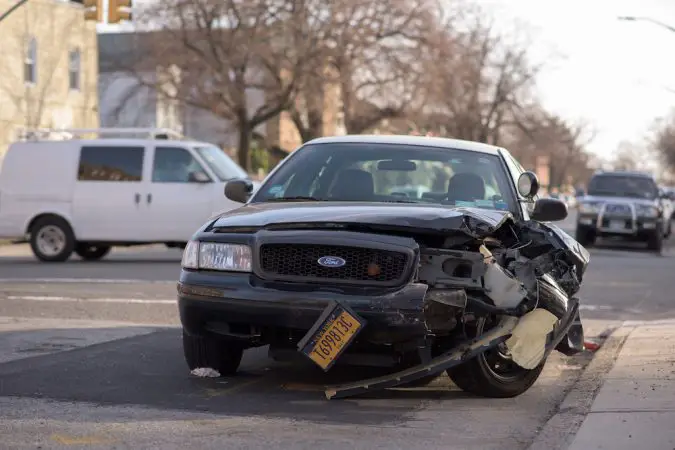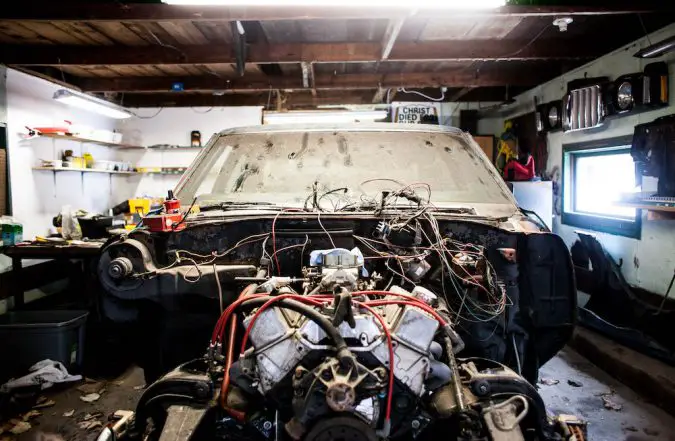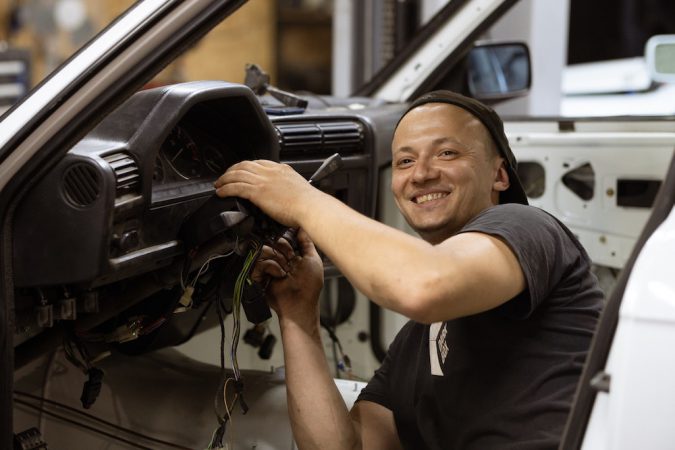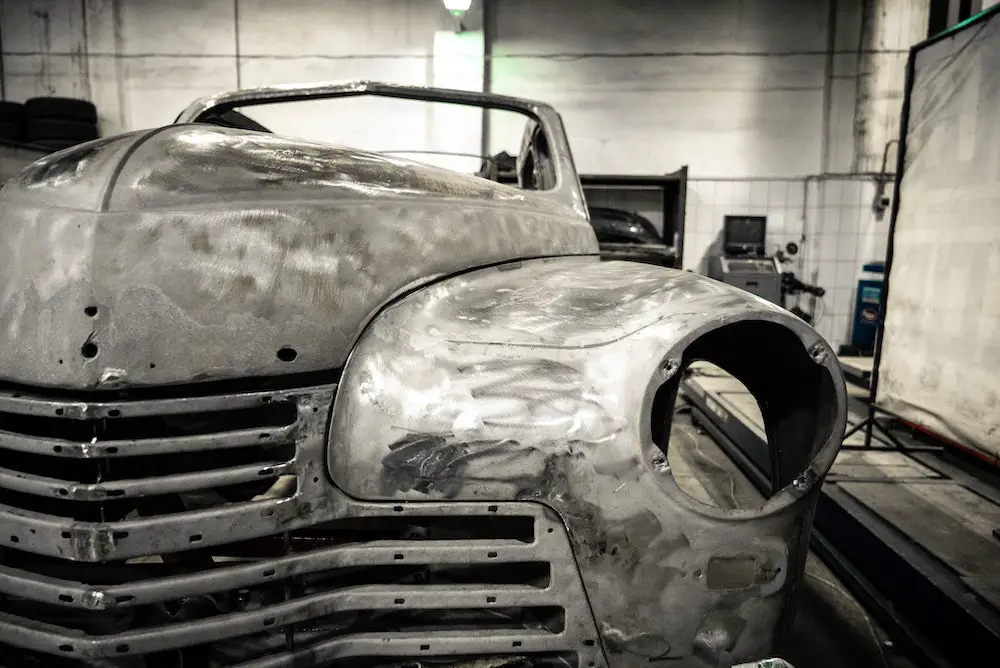If the damage to your car is beyond repair, or the repair costs are just too expensive, then scrapping your car may be the solution. However, what’s the average price for scrapping a car nowadays? That’s what we’re going to answer. We’ll guide you on the average price for scrapping a car, as well as some tips. Hopefully, this will help you get the most amount of cash possible out of your car.
Average Price For Scrapping A Car: What Affects Scrap Car Prices?
Let’s get right into it, so how do you calculate your car’s scrap value? Well, metal prices and the amount of metal in your is what largely affect your car’s scrap value. When a junkyard scraps your car, they will take apart the car first. This process separates the plastic and rubber bits in the car from the metal. They will then take what’s left of the car, recycle the metal, and then sell it off to buyers.
Because of this, the quickest and easiest way to get an estimate is to multiply the weight of your car by the price of scrap metal per ton. As you can imagine, the heavier your car, the larger the payout is likely to be.

Of course, this is just a very quick calculation. To get a more accurate estimate, you’ll need to take into account the price and amount of other metals (such as iron and copper) that your car may have. Don’t worry, we’ll review this in the next segment. But on average, you can expect your car to make around $100 – $200 if you have a compact ar. Full-size cars such as sedans and crossover SUVs will make around $150 – $300. Meanwhile, trucks and SUVs can make as much as $500.
Also, there may be other costs that can affect the price. Such as towing and gas costs and the driver’s wage if you can’t drive the car to the scrap yard. They may also charge you for paperwork and the dismantling process, which lowers the car’s price.
Average Price For Scrapping A Car: Review Current Scrap Metal Prices
As mentioned, recyclable scrap metal prices are what mostly affect your car’s value. This is because junkyards will use the metal from your car to sell again to buyers. Scrap metal prices can change monthly, or even daily a bit like stock prices. This is because the demand and supply of these metals can change all the time. If the demand is low but the supply is high, the price will drop and vice versa.
Especially since scrap metals are also used at an industrial level, their price can change dramatically. Industries like technology, construction, and even the automotive industry often buy recyclable scrap metal. If let’s say, the technology industry is stagnant, then the demand from the industry will drop, affecting the price.
Before we list down the metal in your car and its prices, we’d like to remind you that these prices are accurate at the time of writing. Additionally, keep in mind that these are the prices that a scrapyard will use when they sell the scrap metal. So, you’ll likely get less from the price we’ll list below.
That being said, here is the list of scrap metal that’s found in your car, what they’re worth, and what affects them (as well as the catalytic converter scrap value):
Steel
Most cars are made out of steel. Some cars may use aluminum for their body and chassis, but this is usually only for performance cars. If you drive a regular everyday car, chances are the body and chassis are made from steel. They’re usually around $145 per ton (2025lbs). But the price may be different depending on what type of steel your car uses.
There’s carbon steel, tool steel, alloy steel, and the steel that most cars use is stainless steel. The prices between these types of steel will vary. And as mentioned, they can change depending on industry trends. For example, steel prices dropped in the summer of 2020. This is because of the COVID-19 pandemic, which affects many industries and the economy in general.
The pandemic slowed down production in many industries, leading to lower demand and lower prices of steel. However, the economy has since recovered since fall (for most countries anyway) and steel prices are starting to rise again. If the trend continues, and the pandemic no longer affects the economy, then expect prices to keep increasing.
Aluminum
As mentioned, some cars may use aluminum as the main component for their body and chassis. Although this is mostly true only for performance cars. That’s because aluminum is lighter at around 75% less dense than steel while remaining relatively strong. However, they are more expensive to produce, making them unviable for most regular cars. Additionally, aluminum is hard if not downright impossible to fix, making repair costs very expensive.

Most cars will use aluminum for engine components, engine hoods, radiators, and smaller components such as door handles. You can expect aluminum to sell for around $0.40/lb or about $810/ton. This sounds a lot, but unless your car’s body and chassis are made out of aluminum, you won’t be getting that much. The trend for aluminum is similar to steel, so you can expect the price to climb higher in the future.
Copper
Copper is what you’ll find in your car’s electrical system and wiring since they are excellent conductors for electricity. You’ll find copper in your car’s wiring, starter motor, and alternator. Again, the price trend for copper is similar to other metals: they’ve been climbing since the fall of 2020 with the pandemic finally calming down.
Copper prices vary greatly depending on the type of copper. For example, according to iscrapapp, insulated copper wire is currently at around $1.04//lb. Meanwhile, bare bright copper wire and copper tubing are around $3.50/lb. Additionally, your car is likely to have brass as well. Brass will currently fetch around $1.70/lb
Platinum
Platinum is one of the main components in your catalytic converter. It’s made out of other precious metals as well such as rhodium and palladium, which is why catalytic converters are so expensive. Anyway, platinum is currently worth around $8/lb.
Extracting the platinum from your catalytic converter is an exhaustive process and isn’t worth it if you do it yourself. Additionally, you can’t sell your catalytic converter to another car owner. Fitting a secondhand catalytic converter is a violation of EPA regulations unless it’s been labeled or tested.
However, many recycling companies will buy catalytic converters in bulk. And you can be sure that your junkyard will sell used catalytic converters to them (to find out more, check out our overview of who buys used catalytic converters near me), so be sure to get the most out of your car if you still have a catalytic converter. You can fetch somewhere around $25 – $70 for a catalytic converter, but this number can vary greatly depending on the condition and your car’s make and model.
Lead
Lead is the main component of your car’s battery. Most cars will use a lead-acid battery, while lithium-ion batteries are mostly used in exotic cars and electric cars as their primary means of energy storage. Lead batteries will usually fetch somewhere around $0.22/lb.
Iron
And finally, we have iron. Most cars will use cast iron for certain engine components, including cylinder heads. If you have an older car a diesel vehicle, it’s more likely that your engine block is made from cast iron. Cast iron is currently at around $220/ton or about $0.10/lb.
Average Price For Scrapping A Car: How To Calculate
So, that’s the average price for recyclable scrap metals your car may have. How do you calculate the average price for scrapping a car? As mentioned, you’ll need to multiply the weight of your car with the scrap metal price. Getting an accurate estimate is probably difficult since you can’t know how much of a certain metal is in your car.
However, a 2017 statistic research suggests these are the average content of metal in many cars:
- Most cars will approximately have 1 ton (2025lbs) of steel.
- 416lbs of aluminum.
- 243lbs of iron.
- 69lbs of copper and brass.
- 37lbs of lead from the battery.
Keep in mind that it’s likely your car will have less than what the research state above. But if we use the statistic above, here’s an estimate of how much the car is worth:
- The steel is worth $145.
- $116 worth of aluminum.
- $24 worth of iron.
- $69 worth of copper and brass.
- $8 worth of lead.
Add to that the $25 that the catalytic converter will fetch, and you’re looking at around $387. Again, we remind you that this is a high estimate and you’ll likely get less than. Mostly because it’s unlikely that your car has that much aluminum unless the body and chassis are made out of it. And partly because those metal prices are what the scrapyard will use when they resell the metal, not when they buy it from you.
However, this still gives you an idea of how much your car may be worth. But expect your payout to be lower than the estimate we’ve given above.
Average Price For Scrapping A Car: Tips
So now you know how to calculate the average price for scrapping a car. As mentioned, you can expect around $500 at the very most when you scrap your car. So, how do you get the most out of your car? Well, we have some tips:
Salvage Working Parts
Even if you can’t drive your car, you may still be able to salvage working parts. And these working parts may be able to fetch you more money rather than if you just scrap them altogether. In this case, you might want to go to a salvage yard.
A salvage yard and a scrapyard perform the same function. But in a salvage yard, they will take out the working components and then sell them separately afterward. In return, they’ll offer you more money when you sell the car to them. Alternatively, you can also salvage and sell these parts on your own, but this will require some time and effort since you will essentially need to dismantle your car.

Some salvageable parts may include the wheels and tires, the door handles, mirrors, seats and interior trims, and other electrical accessories such as the speedometer and radio. The starter motor and alternator may also be salvageable and worth more if you salvage them.
Additionally, if for example your car’s undrivable because someone rear-ended you but the engine is still working, you can salvage the engine and sell it off. We’re not quite sure how much a salvage yard will pay for your used engine. But they will often sell a used engine for somewhere around $500 – $1,000 depending on the engine’s conditions.
Don’t Wait, Scrap It Immediately
You may be tempted to wait a bit longer for scrap metal prices to increase so you can scrap your car for a higher price. But this is a bad idea and you shouldn’t wait. This is because the components (including the metals) in your car will quickly deteriorate, especially if the car is left outside.
For example, the body of your car may rust. This will devalue your car’s worth, leading to a lower scrap price (for more context, check out our guide on the Chrysler Town and Country catalytic converter scrap price, as well as the Ford catalytic converter price). It’s best not to wait, get rid of your junk car if you’re not planning to repair it.
Don’t Accept A Price With Conditions
If you can’t drive your car to the scrapyard, the potential buyer may give you a conditional price based on the description of your car that you’ve given. Then they say they will inspect the car when they pick it up and give you a price afterward. And finally, once the car is on the tow truck, they’ll negotiate and give you a lower offer. This pressures you to agreeing to the lower price since the car is on the tow truck.
To avoid this, it’s a good idea to send them photos to back up your description of the car’s condition. If possible, make sure that the price that they gave you is final. However, if they’re adamant about inspecting your car first, then make sure you agree on a price before they put the car on the tow truck.
Negotiate For More Money If Your Car Is Drivable
Some cars may still be drivable even if they’re badly damaged. For example, catalytic converters are monumentally expensive to replace, but you can still technically drive the car without a catalytic converter. It’s just that it will damage the engine further, and is environmentally irresponsible. If you find yourself in this sort of scenario, then make sure you get more out of your car.
In fact, you should probably try to sell your car to a new owner first instead, you’re likely to get more money rather than scrapping it. However, this is essentially selling a broken car, and you’ll have to sell the car at a lower price – deducting the car’s market value with the cost of fixing it.
Additionally, not everyone wants to buy a broken car, so if you’re struggling to find a buyer, then a scrapyard is the solution. But keep in mind you should negotiate for more money when the car is working. First of all, you won’t have to pay for the towing cost to get the car to the scrapyard – the car can get there on its own!
And secondly, they may sell it off at an auction rather than scrapping the car (as you would with the Honda catalytic converter scrap prices and the VW Jetta catalytic converter scrap price). In any case, the scrapping or salvage company is likely to get more out of your car when it’s working. And you should negotiate so you can get more money too!
Average Price For Scrapping A Car: How To Scrap Your Car – The Right Way
Okay, so let’s say you got an estimate on your car’s scrapping price. How do you prepare to scrap your car? Here’s our guide on how to scrap your car:
1. Remove Personal Belongings
The first thing you should do is of course to clean the car from any of your personal belongings. This includes tissue boxes, pillows, phone chargers, spare change, and those original CDs of the world’s best driving music. This may seem obvious, but you’d be surprised how many people forget out to clear out their car. I personally am guilty of this. I forgot to clear out the car just before I sold it, and I spent five minutes frantically cleaning it out.
If you’re no longer driving the car, might as well clean it out before you forget. Make sure to go through the glove compartment, the armrest console, all the door pockets, the trunk, and of course the overhead compartments as well. You might also want to look under the seats, just in case anything fell under there.
And finally, don’t forget to remove insurance cards, personal information, and any sort of documentation from the car. You should also remove the license plate. Some states may allow you to take validated plates to a local licensing office and get a refund.
2. Sort Out The Car Title
You can technically sell a car without a title. Especially since you’re scrapping it, it’ll be a much easier process. But you might want to sort the whole title thing out before you start reaching out to scrap companies, just so that the process can go over smoothly.
Additionally, selling a car without a title may be illegal in some states, even if you’re scrapping it. Best to stay on the good side of the law. This is because you’ll have to report the money you make from scrapping your car to the IRS and having your name in the car’s title will make this a lot easier. No one wants to mess with the IRS.
If you don’t have sole possession of the car title, then you’ll need to get the other owner on board. Or get the title directly in your name. After the sale, the car title will be transferred to the car scrapping company, and they’ll take it from there.
This will also help you decide on a good scrapping company. A reputable scrapping company is unlikely to take the car without the title. Why would they? After all, the title is basically proof of ownership. If it’s not to your name, then what proof do you have that you actually own the car?
3. Salvage Parts
Again we remind you that salvaging parts is a great way to get the most amount of money out of your car. You can do this at a salvage yard, or do it on your own if you want to make more money. Some easy parts that you can take off the car include the tires, battery, bumpers, grille, and lights.
These parts get broken pretty often, and other car owners will often look for salvaged parts as a cheaper repair alternative. If these parts are still working and in good condition in your car, consider salvaging them and selling them online. You’ll have to store them for a while until you find a buyer, but you can get more money out of your car this way.
After you salvage the parts, you can then bring your car or contact the scrapping company to agree on a sale and pick up your car.
Scrap Car Facts: What You Need to Know to Get the Best Value
- A scrap car is an old or damaged car that is processed by a licensed metal recycler.
- Scrap cars typically have high mileage and body or mechanical damage, and are worth the material they are made of.
- The scrap value of a car is usually calculated by its weight, with mid-size cars worth between $150-$300.
- Scrapping a car for parts can yield more money than scrapping the whole car.
- Components such as engines, transmissions, catalytic converters, and rims can fetch a higher price when sold separately.
- The scrap value of a car can be affected by factors such as make and model, location, and age.
- Selling a car to a junkyard will generally only get you the scrap value of the car, while selling it online or privately can yield more money.
- The scrap value of a catalytic converter can range from a few hundred dollars to $1,100 depending on the vehicle and metal content.
- The average scrap value of a car battery is 0.21-0.41 cents per pound, which can amount to $6-$20 for each battery.
- Radiators can have scrap value ranging from $5 to $30 depending on the type and car being sold.
Average Price For Scrapping A Car: Wrap Up
The average price for scrapping a car is usually somewhere around $100 – $300. On average, you’ll get about $150 for scrapping your car. If you have a larger vehicle such as a truck or SUV, you can earn up to $500 since they weigh more and have more metal in them.
If your car is still drivable, consider selling it rather than scrapping it. You’ll have to deduct the market price with the cost estimate to fix the car, but you’re likely to get more money. But if you struggle to find a buyer, then consider salvaging the usable parts to get the most out of your junk car.
You can salvage and sell these parts individually, and you’ll definitely get more from them than what the scrapping company will pay you. Parts you can salvage include the tires, lights, bumpers, and even the engine! Of course, this depends on how much time you have on your hands, as well as your willingness to tear down a car. If you don’t feel like dealing with the hassle, then scrapping your car entirely is a viable option.


2 comments
I like the efforts you have put in this, regards for all the great content.
Great information shared.. really enjoyed reading this post thank you author for sharing this post .. appreciated